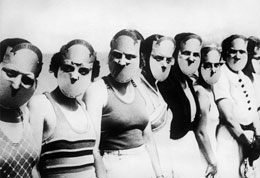25th Jun 2015 - 26th Jun 2015
Rooms M2 and GP225, Grand Parade

When politics, arts, history, ethics or philosophy are judged by their ability to disrupt what is visible and sayable, is there a danger that the potential political efficacy in remaining hidden is ignored and the possibility of intervention/action for the already unseen is inhibited? How do artistic practices reflect and engage in strategic invisibility? What are the artistic and political intersections of acting invisible? What kinds of visibility are afforded to whom? How can research approach invisibility without eliminating the invisibility it purports to study? Can there be a methodology of working around (in)visibility and if so what claims can it make to validity? What is the difference between choosing to perform a strategic invisibility and the (mis)performance of an imposed visibility? In what ways do we labour in visible resistance and invisible complicity?
This two-day conference explores some the following issues:
Aesthetics, art and performance
The politics of the mask and ‘masking up’
Contemporary performance practices and negotiations of space through ‘blending in’
Politics, public policy, public services and whistleblowing
Democracy and/as visibility
Surveillance, policing and erasure of protests
Media, war and conflict, (in)visibility of bodies
Anonymity, pseudonyms, identity, non-identity, impact of technology on the self
Ghosts, witchcraft, affect, death, mourning, otherness, the incomprehensible/unintelligible
Non-spaces, heterotopias
Gender, race, oppression and (in)equality
Visible and invisible history, ‘hidden transcripts’ and the history from below
(In)visibility in research and academia, para-academia and open access publishing
The call for papers deadline has now passed. If you have any queries, please contact a.rajala@brighton.ac.uk or h.mcknight1@uni.brighton.ac.uk
Martin E. Jay, Professor of History at the University of California, Berkeley
Martin E. Jay is the Sidney Hellman Ehrman Professor of History at the University of California, Berkeley. His work spans numerous fields, including European intellectual history, critical theory, and visual culture. He has published books on a wide range of topics, including Adorno (1984), Downcast Eyes: The Denigration of Vision in Twentieth-Century French Thought (1993), and, most recently, Essays from the Edge: Parerga and Paralipomena (2011).
Michael O’Rourke Faculty of Gender Studies, Institute of Social Sciences and Humanities, Skopje, Macedonia
Michael O’Rourke is a visiting lecturer in the Faculty of Gender Studies, Institute of Social Sciences and Humanities, Skopje, Macedonia, he works mostly at the intersections between queer theory and continental philosophy. He is the author of Queer Insists (2014), Queering Speculative Realism (forthcoming), Rogue Theory (forthcoming) and co-author of The Pervert’s Guide to Reading (forthcoming). He has published extensively in the areas of Queer Theory, Deconstruction, Speculative Realism, Object Oriented Ontology, Psychoanalysis, Gender and Sexuality Studies and Feminist Theory.
About the Critical Studies Research Group
The Critical Studies Research Group (CSRG) was founded in 2011 by postgraduate students at the School of Humanities, University of Brighton, with the aim of providing a stimulating forum for the discussion and exploration of critical ideas and practices in light of the socio-political challenges we face today. The CSRG shares a strong commitment to interdisciplinarity: our current research interests range from a concern with continental philosophy and re-conceptualisations of materialism, via environmental and medical ethics, to memory studies and cultural history. The challenges that interdisciplinarity might pose are counteracted by our shared interest in the role and scope of critical thought and practice within contemporary capitalism.